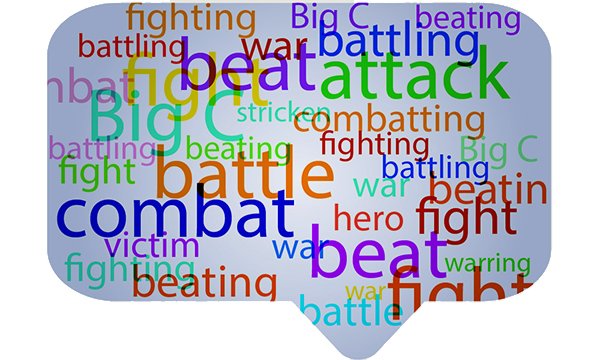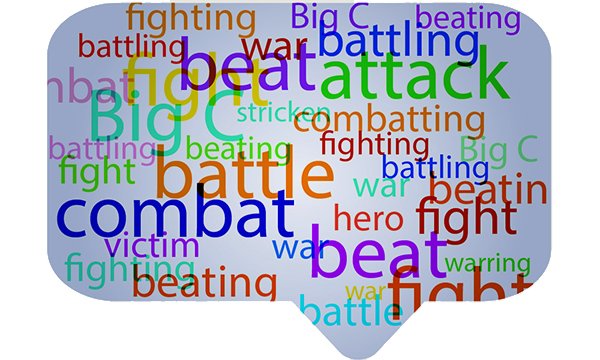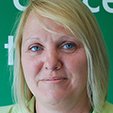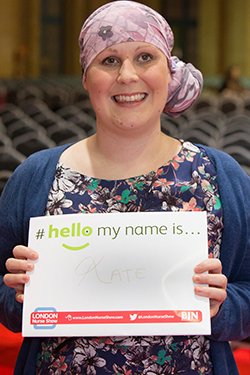Mind your cancer language

Poll reveals 40% of people thought militaristic words such as 'fight' or 'hero' were inappropriate when referring to cancer

How many times have you opened a newspaper and seen a celebrity promising to ‘fight’ their cancer? Or a politician vowing to help the NHS ‘battle’ the disease?
Only this month health secretary Matt Hancock marked World Cancer Day by tweeting about his support for ‘beating’ cancer.
Such language is meant to be empowering, but according to research by Macmillan Cancer Support it may not always be helpful.
A poll of more than 2,000 people carried out by YouGov for Macmillan found a significant degree of unhappiness about the use of militaristic words.
When asked whether terms such as ‘lost their battle’, ‘cancer stricken’ or ‘hero’ were appropriate, about four in ten consistently said they were not.
Survivorship agenda

Cruickshank
Media articles and posts on social networks were considered to use such language most, although one in five respondents said their family and friends use it, and nearly one in ten said health professionals do.
RCN cancer and breast care forum chair Susanne Cruickshank understands why people can feel uncomfortable about such language.
‘It suggests you have some control over cancer when you don’t,’ she says. ‘You would not get it for other diseases – no one asks: “How’s your fight against your stroke going?” or: “Are you beating diabetes?”.’
‘It is probably linked to the survivorship agenda pushed by charities. Celebrities and the media have picked up on it and I’ve even seen government documents guilty of it. There’s a Scottish Government document called Beating Cancer.’
Active listening

Macmillan Cancer Support specialist adviser for treatment and recovery Dany Bell says: ‘A lot of the time healthcare professionals feel the need to say something, anything, to support a person.
‘But sometimes the best thing they can do is to actively listen to understand the individual’s perspective on their own cancer experience.’
But does this go deeper than a few badly chosen words or does the NHS have a wider problem with communication?
Three years ago, a Marie Curie report warned that poor communication could be costing the NHS in excess of £1 billion a year because of a lack of adherence to medicine regimes, repeat visits to clinics, disputes and ultimately litigation.
Communication skills
Then there is the #hellomynameis campaign, which was created by Kate Granger after she was left exasperated by the number of staff who failed to introduce themselves to her when she was receiving care for terminal cancer.

#hellomynameis campaign
Picture: Barney Newman
Nicola Schofield, a senior trainer at the Maguire Communication Skills Unit, part of The Christie NHS Foundation Trust in Manchester, says it is too easy to dismiss the importance of communication.
‘Communication skills are often seen as a soft science or as unimportant. But communication is at the heart of everything we do as nurses.’
She teaches nurses and other staff to look for cues and to never make assumptions.
‘When a patient says: “I’m worried”, the common response is to say they will be fine. But what you need to do is find out what they are worried about because it could have an impact on treatment.
‘They may be saying they don’t want to go through chemotherapy again. They may be making a decision about their end of life care.’
Communication training
The Maguire Unit is one of only a few dedicated NHS services providing communication training. Another is run by University College London Hospitals NHS Foundation Trust (UCLH).
This scarcity of courses is one of the core problems with communication training, according to the trust’s lead cancer nurse Alison Hill.
‘We used to have dedicated funding, but that went with the cancer networks,’ she says.
‘This means that, outside of undergraduate and postgraduate training, it is up to trusts themselves either to commission from higher education institutions or run it themselves.’
Knowing how to respond
UCLH runs three courses for staff at all grades, with the advanced course attracting professionals from all over London.
Ms Hill says: ‘Senior staff have to be skilled at communicating. They have to break bad news and explain complex issues. Then they need to be able to respond to patients.’
But she says other members of the wider team, including non-specialist staff who work on wards where cancer patients are cared for, need to be able to communicate well too.
‘Patients will often ask questions of more junior members of the team. They may think the senior staff are busy and they are more likely to have had more contact with the junior member and feel closer to them.
‘These staff need to know how to respond, and when and who to ask for more information.’
The art of good communication
UK Oncology Nursing Society board member Mark Foulkes, who is an acute oncology nurse consultant, says the ability to communicate well comes with experience as well as training.
His area of care means he can find himself asked by patients how they are going to die.
‘I try to be clear, honest and compassionate. You have to be prepared to repeat things and make yourself available for further questions
‘Writing things down in care plans helps. You also have to deal with their families. The sort of questions they ask can be different, but you must give consistent answers.’
Top tips for good communication:
- Gather information before giving information
- Ask about feelings
- Empathise with the patient’s experience
- Explore the reason for a question before you respond to it
- Use the patient’s language and acknowledge the patient’s emotion
- Summarise what the patient has said
- Give information slowly in small chunks at the patients pace
Source: Maguire Communication Skills Unit
The views of patients

‘Cancer-speak is negatively loaded’
Mandy Mahoney, 47, a mother of two, was initially diagnosed with breast cancer in 2011. She has had five further recurrences and is now living with incurable breast cancer.
‘Cancer-speak can be quite negatively loaded – the “brave fighter, warrior and survivor” are standard descriptors, and put an awful lot of pressure on the newly diagnosed person. I prefer clear, factual language. I describe myself as “living with incurable cancer’” I’m not brave or inspirational, I’m just trying to live the life I have left well.’
Fighting talk ‘empowered me’

Craig Toley, 31, from London, was diagnosed with thyroid cancer in 2016 and is now in remission.
‘Language such as “fight’” “struggle”, “warrior” and “battle” will be interpreted differently by different people.
‘Personally, I found those words helped empower me and made me think of my cancer as a challenge I needed to fight. Everyone likes the story of a fighter.’

‘I was isolated’
Raveen Sethi 24, from Essex, was diagnosed with Hodgkin lymphoma in 2018 and is now in remission.
‘My pet peeve was people telling me “your hair will grow back”. I didn’t choose to lose my hair so I found this unhelpful. I did find I was isolating myself from my friends. I just wanted someone to talk to.’
Find out more
Marie Curie (2016) A Long and Winding Road: Improving Communication with Patients in the NHS
